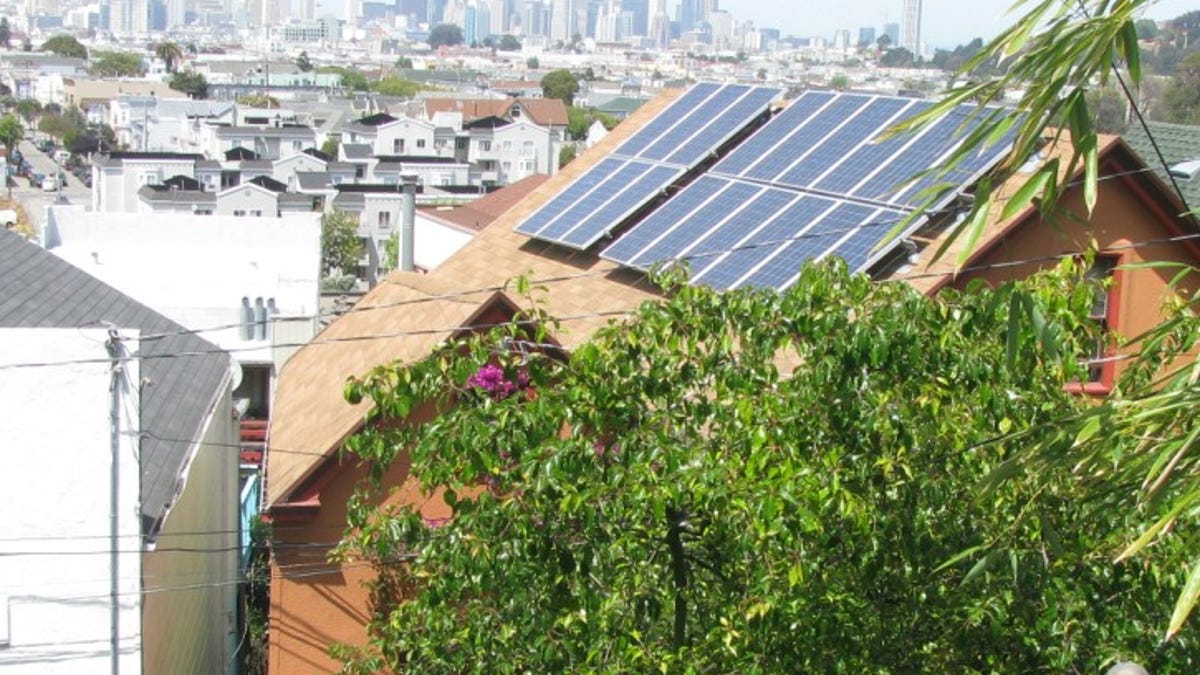Solar grants sweeten San Francisco for start-ups
San Francisco approves the nation's largest grant program for homeowners, businesses, and nonprofits installing solar power.

Aggressive plans to expand renewable energy in San Francisco moved ahead Tuesday as the city's lawmakers approved grants to help homeowners, businesses, and nonprofits add solar panels to their buildings. Solar power companies are gearing up to meet an anticipated jump in demand in the city.
Over the next decade, between $3,000 to $6,000 will be available to each homeowner to cover the installation of solar panels, as well as $10,000 for businesses and nonprofits, and $30,000 for nonprofit affordable housing.
"This rebate program further establishes San Francisco as America's solar energy leader and symbolizes the commitment of the city to make affordable solar power available to those who want it," Mayor Gavin Newsom said in a statement.
He hopes the incentives will launch in July with some $3 million in annual funding, and touts their potential for attracting more businesses and green jobs.
However, the city has a long way to go before becoming a solar capital, regionally or nationally. The San Francisco Solar Task Force ranked the city last in the Bay Area for the number of solar installations, with panels on only 744 of 195,000 rooftops.
The subsidies would support some 50 megawatts of solar power across 10,000 buildings within a decade, if the mayor has his way. Political wrangling had delayed his planned April launch for solar incentives.
Lyndon Rive, CEO of installer SolarCity, joined others in the solar industry in praising the city's program.
"It's simple, easy to understand, and easy to implement," said Rive, who anticipates the number of solar panels to triple in San Francisco, where SolarCity is the largest solar installer, with 40 employees. It's also developing a "green" job training academy in a low-income neighborhood.
Rive noted that until now, his company's solar panel-leasing program was too pricey for the majority of San Francisco residents.
With the city incentives added to federal tax credits and state rebates, costs for a homeowner who might otherwise spend $30,000 to install solar panels would drop to near $6,000.
"This is just gonna spur the industry," said Kevin Gage, sales director for San Diego-based installer Borrego Solar. "The market was essentially shut down in San Francisco. Now a lot of companies like ours are gonna move into San Francisco."
Solar installers and equipment makers are increasingly pitching their services to people seeking to escape or offset rising energy costs. San Francisco utility Pacific Gas & Electric on Tuesday announced a proposed 6.5 percent electricity price hike.
The city incentives are bright news to San Franciscan Sylvia Ventura, whose condominium has 2.5 kilowatts of rooftop photovoltaics. However, she foresees a "feeding frenzy" among solar installers and start-ups that could confuse consumers.
"This business was done for a long time in the shadows and some installers took advantage of people being intimidated by the data, not understanding metering, wattage, and what to pay," she said.
Ventura wants communities to harness collective bargaining power to further lower residential solar setup costs. She and husband, Dan Barahona, launched One Block Off the Grid, a grassroots effort aiming to coordinate additional, privately funded subsidies for enough homeowners to make up the equivalent of a city block.
They plan to secure free solar installation for the first 50 San Francisco homeowners who sign up. The list is more than half full.
Ventura and Barahona hope that high-tech companies will volunteer to provide the funds, and they're talking with banks about setting up unique financing plans. However, the fledgling effort hasn't at this point secured corporate partners.